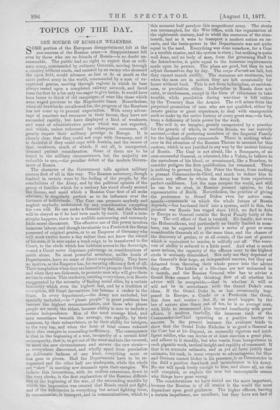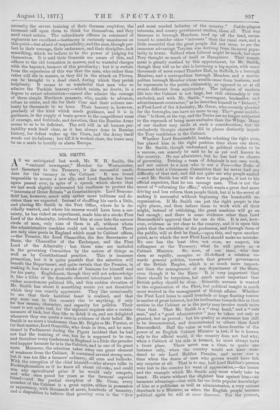TOPICS OF THE DAY.
ONE SOURCE OF RUSSIAN WEAKNESS.
SOME portion of the European disappointment felt at the non-success of the Russian arms—a .disappointment felt even by those who are no friends of Russia—is no doubt un- reasonable. The public had no right to expect that an ordi- nary army, commanded by ordinary Generals, moving through a country without roads, and resisted by an enemy who shunned the open field, would advance as fast or do as much as the most perfect army in the world, commanded by a man of ex- ceptional genius, moving through regions in which its base always rested upon a completed railway network, and faced from the first by a foe only too eager to give battle. It would have been fairer to think of old campaigns, of wars like those which were waged previous to the Napoleonic times. Nevertheless, when all drawbacks are allowed for, the progress of the Russians has not come up to general expectation. With every advan- tage of numbers and resources in their favour, they have not succeeded rapidly, but have displayed a kind of weakness, and want of administrative power which was not expected, and which, unless redeemed by subsequent successes, will greatly impair their military prestige in Europe. It is already clear that they could not cope with Germany, and it is doubtful if they could cope with Austria, and the causes of that weakness, much of which, if not all, is unexpected, demand patient consideration. Some of them are to be found in the military circumstances, but the majority are reducible to one,—the peculiar defect of the modern Govern- ment of Russia.
The character of the Government tolls against military success first of all in this way. The Russian autocracy, though limited in certain ways by the feeling of the people, by the sensibilities of the Army, and by the political opinion of the group of families which for a century has stood closely around the throne, and amid which a Russian Czar first of all seeks advisers, is singularly perfect as to its influence over the fortunes of individuals. The Czar can promote anybody and neglect anybody, undeterred. by any consideration excepting his own will. He can make a General by fiat, and the General will be obeyed as if he had been made by merit. Until a cata- strophe happens, there is no audible murmuring and extremely little secret discontent. The effective use of this power involves immense labour, and though invaluable to a Frederick the Great possessed of original genius, or to an Emperor of Germany who will work twelve hours a day rather than not know the record of his men, it is sure under a weak reign to be transferred to the Court, to the circle which has habitual access to the Sovereign, —and a Court never dispenses patronage on considerations of merit alone. Its most powerful members, unlike heads of Departments, have no sense of direct responsibility. They have no motive, as the Emperor has, for securing efficiency first of all. Their temptation when they are honest is to promote their friends, and when they are dishonest, to promote men who will give them service in return. This tendency, existing everywhere, is in Russia exaggerated by the necessity of finding social allies, by a certain insecurity which even the highest feel, and by a tradition of corruption, till Court favouritism has become a canker in the State. In every department,—the Army not excluded, but specially included,—to "please people" in great positions has become the highest recommendation, and those who please people are rarely the ablest, because ability is sure to include a certain independence. Men of the most average kind, and men sometimes beneath the average, rise rapidly, by their manners, by their subservience, or by their ability for intrigue, to the very top, and when the hour of trial comes exhaust their thin energies in concealing inefficiency. The consequence is that in the beginning of a war, incapacity of a certain kind —incapacity, that is, to get out of the usual and into the unusual, to meet the new circumstances and answer the new strain— is everywhere discovered, and wholly apart from peculation or deliberate badness of any kind, everything more or less goes to pieces. Half the Departments have to be re- organised and the other half are inadequate, while the whole are " slow " in meeting new demands upon their energies. We believe this favouritism, with its endless extensions, down to the very clerks, is the first explanation of the Russian difficul- ties at the beginning of the war, of the astounding muddle by which the impression was created that Russia could not fight, and of the deficiencies in everything but actual fighting force, in commissariat, in transport, and in communications, which to this moment half paralyse this magnificent army. The strain was unexampled, for the War Office, with the organisation of the eighteenth century, had to wield the resources of the nine- teenth, had as it were to transport a modern nation on ox- carts, and the brain-power in the Departments was not quite equal to the need, Everything was done somehow, for a Czar is a terrible master, and the system is stern ; but nothing is quite well done, and no body of men, from the governing Staff to the Intendencies, is quite equal to the immense requirements made upon its powers. The plans are good, but they do not adjust themselves day by day. The cops d'arme'e are full, but they cannot march swiftly. The resources are enormous, but when the men are in motion they are left occasionally for hours without food. This is not from indiscipline, or careless- ness, or peculation either. Indiscipline in Russia does not exist, or carelessness, except in the form of reluctance to take trouble, while peculation during war-time is felt rather by the Treasury than the Armies. The evil arises from the perpetual promotion of men who are not qualified, either by innate genius or great experience, to deal with emergencies such as make up the entire history of every great war,—in fact, from a deficiency of brain power for the work, The evil is, we imagine, greatly exasperated by a practice, for the growth of which, in modern Russia, we can scarcely account,—that of preferring members of the Imperial Family for the highest military commands. There is nothing what- ever in the situation of the Russian Throne to account for this custom, which is not justified in any way by the ancient history of Russia. The Czar is not afraid, like a Bonaparte, of an over-successful General, or educated, like a Valois, to believe in the sacredness of his blood, or accustomed, like a Bourbon, to consider pedigree the first qualification for command. There is nothing to prevent him, like Peter the Great, from making a peasant Commander-in-Chief, and much to induce him to choose any officer hi whom the Army has from experience perfect confidence. Let the man conquer the world, and still he can be no rival, in Russian peasant opinion, to the representative of Hunk. Nevertheless, the practice of giving the preference to Grand Dukes even for active com- mands—commands on which the whole future of Russia depends,—has hardened itself into a system, until in this, the greatest war Russia has waged since 1815, we find in Asia or Europe no General outside the Royal Family fairly at the top. The evil effect of that is twofold. No family, not even the Hohenzollerns, and particularly no family limited in num- bers, can be expected to produce a series of great or even considerable Generals all at the same time, and the chance of the discovery of genius, or at all events, of the sort of genius which is equivalent to armies, is wilfully cut off, The reser- voir of ability is reduced to a little pond. And what is much more serious, the capacity of the officers next to the highest circle is seriously diminished. Not only are they deprived of the General's first hope, an independent renown, but they are debarred from throwing their whole power into the advice they offer. The habits of a life-time are not unlearned in a month, and the Russian General who has to advise a Grand Duke cannot help thinking first of all whether his advice will be acceptable,—that is, whether it will or will not be in accordance with the Grand Duke's own ideas. If the Grand Duke is, as has occasionally hap- pened in Europe, a Conde or a Frederick the Great, this does not matter ; but if, as must happen by the law of nature nine times out of ten, he is an average man, with little to recommend him beyond familiarity with great affairs, it matters fearfully, the immense rank of the Commander-in-Chief operating as a positive barrier to success. In the present instance the evidence tends to show that the Grand Duke Nicholas is as good a General as the Czar has at his disposal, an unusually vigorous and intel- ligent soldier, who can devise or at least sanction a great plan, and adhere to it steadily, but who wants, from inexperience in such gigantic work, tactical insight and rapidity of command. If that is an accurate estimate, and as yet all facts justify that estimate, his rank, in some respects so advantageous, for Slav and German cannot bicker in his presence, is as Commander in the field a positive drawback and incumbranee to his Army. No one will speak freely enough to him, and above all, no one will complain, or explain the true but unacceptable reason why things have gone wrong. The considerations we have stated are the more important, because the Russian is of all armies in the world the most dependent upon good guidance. The higher officers, barring a certain impatience, are excellent, but they have not had of necessity the severe training of their German coVreres, the incessant call upon them to think for themselves, and they need exact orders. The subordinate officers in command of regiments are excellent—testimony is curiously unanimous on this point—but afraid of responsibility, and the men, though per- fect in their courage, their endurance, and their discipline, lack something, which we believe to be the power of judging for themselves. It is said their Generals are aware of this, and adhere to the old formation in masses, and to wasteful charges with the bayonet, because of this peculiarity ; but it is certain from the experience of this war that the men, who rather than retire will die in masses, as they did in the attack on Plevna, can be brought to a dead stand, during which they perish helplessly. It seems to us wonderful that men who so admire the Turkish bravery—which exists, no doubt, in a degree to extort admiration—cannot also admire the courage of these simple Northern peasants, who, unable to advance, refuse to retire, and die for their Czar and their colours use- lessly by thousands in an hour. Their bravery is, however, precisely of the kind which needs guidance, and it is in guidance, in the supply of brain-power to the magnificent mass of courage, and fortitude, and devotion, that the Russian Army seems to us to be deficient. The evil will in all human pro- bability work itself clear, as it has always done in Russian history, for defeat wakes up the Czars, and the Army itself weeds out its failures ; but till it is worked clear, the losses may be on a scale to horrify or alarm Europe.































 Previous page
Previous page